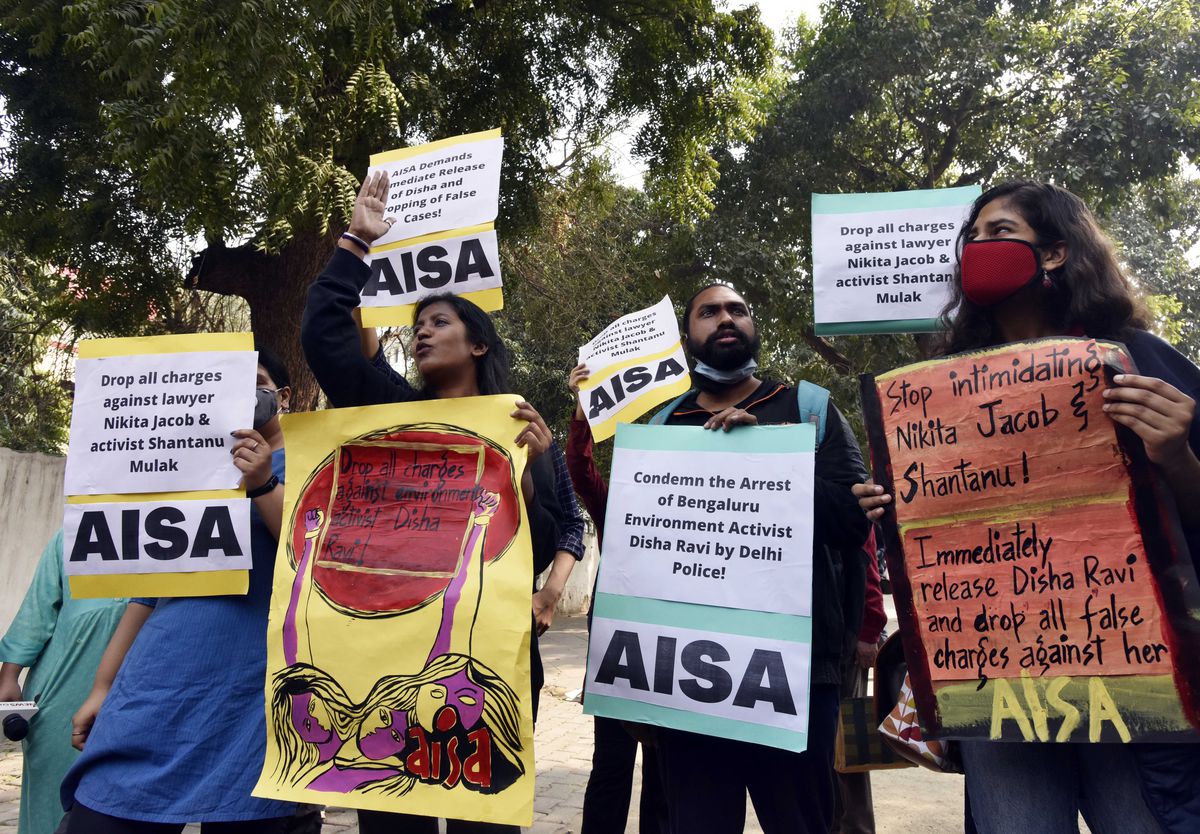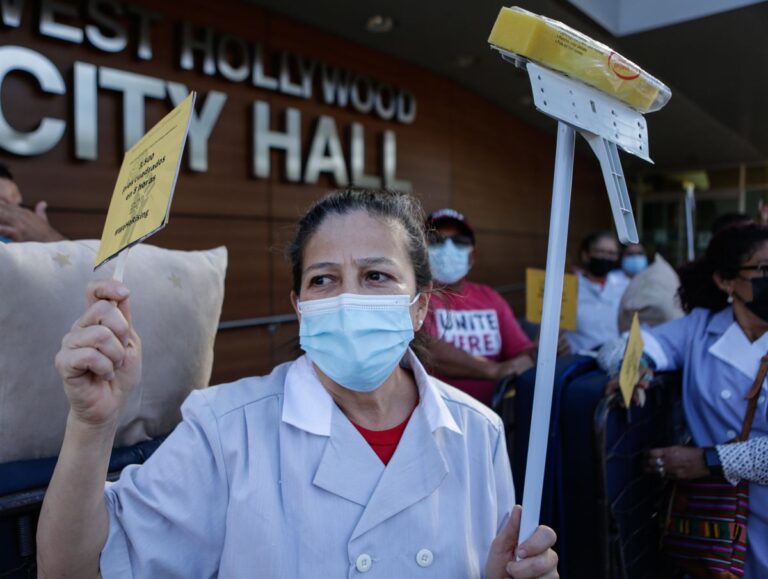The arrest of 22-year-old Indian climate activist Disha Ravi is the latest in a series of heavy-handed tactics Indian Prime Minister Narendra Modi’s government is using to suppress support for thousands of farmers who have been protesting for months against agricultural reforms.
The Delhi police accuse Ravi of being an “editor and key conspirator” in creating a farmers’ protest “toolkit,” a document that was shared widely online, including on Twitter by Swedish climate activist Greta Thunberg. The toolkit contains a brief argument for why people should support the farmers’ protests, a list of suggested actions people can take internationally to do so, and some additional resources to help people organize.
Thousands of farmers have been blocking roads into New Delhi for months, demanding the repeal of three laws that Modi’s Bharatiya Janata Party passed in September as a part of a plan to make India a $5 trillion economy by 2024.
The laws, which some experts say are necessary to modernize India’s economy, remove longstanding restrictions on how and where produce is sold. Farmers who used to sell their produce at government-sanctioned markets called mandis are now able to sell wherever they please.
But the farmers are worried that the reforms will leave them at the mercy of large corporations that will buy their crops for low prices, leading to their financial ruin. Their cause gained even more international attention earlier this month, when international celebrities including pop star Rihanna and Thunberg tweeted about the protests.
But that online support also drew the attention of Modi’s right-wing nationalist government, which has sought to control the narrative around the protests and suppress dissent. The latest action in response to the toolkit is part of that effort.
The Delhi police allege the document is a call to “wage economic, social, cultural, and regional war against India” and accuse Ravi of using it to “spread disaffection with the Indian state.”
“The main aim of the toolkit was to create misinformation and disaffection against the lawfully enacted government,” Delhi Police official Prem Nath told reporters at a press briefing about Ravi’s arrest on Monday.
Disha Ravi, arrested by CyPAD Delhi Police, is an Editor of the Toolkit Google Doc & key conspirator in document’s formulation & dissemination. She started WhatsApp Group & collaborated to make the Toolkit doc. She worked closely with them to draft the Doc. @PMOIndia @HMOIndia https://t.co/e8QGkyDIVv
— #DilKiPolice Delhi Police (@DelhiPolice) February 14, 2021
Ravi, an outspoken climate and animal rights activist and co-founder of India’s chapter of Fridays for the Future, a student climate movement founded by Thunberg, was arrested Saturday in her hometown, the southern city Bengaluru, on charges of sedition and conspiracy. She was then flown to appear before a New Delhi court on Sunday, where she has been ordered to remain in custody for five days.
Appearing in court on Sunday without her own lawyer, Ravi denied the charges. “I did not make [the] toolkit,” Ravi, who was instead represented by a “stand-in” government lawyer, told the court. “We wanted to support the farmers. I edited two lines on February 3,” Ravi said.
But according to Delhi police, Ravi’s role in creating the document was much bigger than she’s admitting to. Delhi police say she was a “key conspirator” in the toolkit’s “formulation & dissemination” and that she created (and later deleted) a WhatsApp group to collaborate with others on drafting the document.
According to local news reports, Ravi is not alone in being charged for her role in editing the toolkit. Delhi police say lawyer Nikita Jacob and activist Shantanu Muluk participated in a Zoom call to discuss the toolkit on January 26, when peaceful farmers’ protests scheduled to coincide with the country’s celebration of Republic Day erupted into violent clashes with police.
Ravi is being held under a sedition law long used by the government to squash dissent
Under India’s sedition law, which Ravi has been charged with violating, “words, either spoken or written, or by signs, or by visible representation, or otherwise, brings or attempts to bring into hatred or contempt, or excites or attempts to excite disaffection towards the government” are punishable by a fine and, in the most extreme cases, life imprisonment.
But Ravi’s arrest for her involvement with the toolkit appears to follow a dangerous pattern of the Indian government using the sedition law to silence its critics.
A 2016 report by Human Rights Watch found that Modi’s government “uses draconian laws such as the sedition provisions of the penal code, the criminal defamation law, and laws dealing with hate speech to silence dissent.”
“These laws are vaguely worded, overly broad, and prone to misuse, and have been repeatedly used for political purposes against critics at the national and state level,” the report states.
Indeed, several prominent legal experts in India have questioned the charges against Ravi, arguing that her support for the farmers does not equal an attempt to overthrow the government. “Supporting farmers does not amount to sedition,” Rakesh Dwivedi, senior advocate for the Supreme Court of India, said Monday in reference to Ravi’s case.
Another legal expert called Ravi’s arrest “unwarranted” and told the Times of India that Ravi’s action “appears to be nothing more than youthful exuberance in trying to engage on socially important issues on her part,” but that her arrest “appears to be a more blatant attempt by police to silence the dissenters.”

Ravi’s arrest has been further criticized on Twitter by some who see the detainment of the young climate activist as the latest in a series of attacks by Modi’s party on free speech.
Delhi Chief Minister Arvind Kejriwal tweeted on February 14 that Ravi’s arrest was “unprecedented attack on democracy.”
The same day, an opposition member of India’s parliament, P. Chidambaram, also weighed in on Ravi’s arrest, tweeting that “the Indian state must be standing on very shaky foundations if Disha Ravi, a 22 year old student of Mount Carmel college and climate activist, has become a threat to the nation.”
Meena Harris, niece to US Vice President Kamala Harris, tweeted a link to Ravi’s story with information about activists being targeted and silenced by the Indian government.
Thunberg, who tweeted a link to the toolkit on February 3 as a part of her broader support for the farmers’ protests, declined to comment on Ravi’s arrest on Monday. Thunberg and Rihanna have been subjected to vicious online attacks by right-wing pro-Modi trolls since speaking up for the farmers.
But friends of Ravi’s are expressing shock at the arrest of someone whom they say took pains to follow the law.
Those who knew Ravi remarked on how conscientious she was at protests, “urging us all to not obstruct traffic, or do anything that would inconvenience others,” a friend from Ravi’s hometown and fellow member of her Fridays for the Future climate group told Reuters, speaking on condition of anonymity for fear of making her situation worse.
“It was hard for me to believe she is in this situation, because she is a very friendly, law-abiding person,” the friend said.






